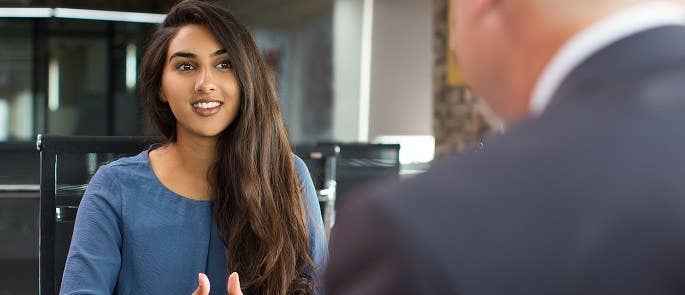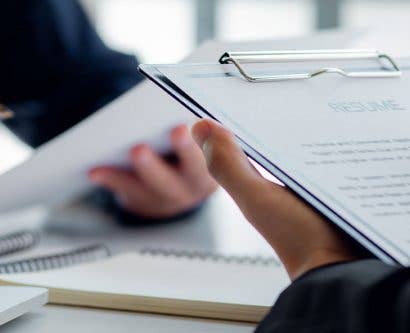How to Prepare for Your First Interview
Securing your first job interview is no mean feat, especially in these uncertain economic times. Take a minute to savour the moment, and reflect on your achievements so far. You know your prospective employer is impressed with you on paper, so now is the time to ace the job interview.
Whether you are making the leap from college into paid employment, or you are a graduate seeking advice on interview techniques, read on to discover how to prepare for your first job interview. In this article, we will inform you how to prepare for the big day. We will outline common interview techniques, and the importance of preparation. We will also look at a sample of job interview questions and answers.

What is a Job Interview?
A job interview is a formal meeting in which an applicant is asked a series of questions to determine their suitability for a specific role. A job interview is a universal rite of passage for the majority of us. At some point in our lives, we are very likely to face a job interview of some description. Therefore, it is beneficial to find out more about the process and what it entails.
Many see the process as an exchange of information between the interviewer and the hopeful candidate. The outcome of the exchange should allow both the interviewer and the candidate to assess whether or not they are a good fit for the company and its culture.
The prospective employer will attempt to uncover whether or not your skills match those set out in the job description and person specification. They may wish to find out more about your academic qualifications, your basic skills, and aptitude to fulfil their criteria. As a candidate, use the opportunity to grasp a sense of the company’s ethos. In doing so, you can decide if your values align. Although the process can feel stressful, try to focus on what you can bring to the role and the business. Have confidence in your ability, and try to let this shine through on the day.
According to Glassdoor, the average employer spends £3,000 and 27.5 days when hiring a new worker. As recruiting costs are often high, it is in businesses’ interests to make sure the interview process is as well-planned and thorough as possible. Doing so means they will attract the best talent.

Types of Job Interview
There are numerous different types of interview scenarios. These include:
Face-to-face
Panel
Group
Video and remote
Phone
Lunch
Behavioural
Case
Competency
Stress

Why is it Important to Prepare for an Interview?
Being well prepared for the interview tells future employers that you are organised, thorough, and take your work seriously. A key interview question is: Why do you want to work for us? In order to answer this effectively, research is key. If your answer is poorly considered, then interviewers may begin to question your intentions and commitment.
Interviewers will use the process to find out as much about you as possible – your skills, your previous experience, your suitability for the role, and how you would fit into the company culture. Candidates who are well prepared will immediately stand out from those who are not. Therefore, set aside time in the days leading up to the interview, so you feel as prepared as possible.
Depending on the application process, some interviewers will ask you to bring a copy of your CV to the interview. If you need support in writing your CV, then find out all you need to know here.
Interview Preparation Tips
Start by finding out as much as you can about your prospective employer. Read their website, and look at all of their social channels. It may also be worth seeing if they have any reviews on rating sites such as Trustpilot and Glassdoor.
Next, read the job description and person specification thoroughly. It can be useful to jot down how your skills and experience match each individual descriptor. Look at the desired qualities and think of some examples of how you have demonstrated that skill, whether this be in work or in your education.
If you feel your experience is lacking in a certain area, it may be worth considering taking a personal development course. Or, if you’re looking to help those you work with, it may be worth taking our coaching and mentoring course. Try to anticipate the interviewer’s reservations and concerns. Ideally, you will be able to state what you are doing to upskill.
Finally, prepare your answers to the most common interview questions. Employers will want to hear your natural responses, but the more you practise, the better prepared you will be.

How to Ace a Job Interview
The panel are likely to decide whether or not you are suitable for the role within the first five minutes of the interview. As a result, it is important that you reflect your passion and suitability for the position within that time frame. Be polite, smile, and sit in a professional manner. If you feel nervous, take some deep breaths and focus on your reasons for wanting the position, and what you can bring to the role.
Think carefully about your attire. Some businesses may request that employees dress formally, but others will just ask that you feel comfortable. If you are unsure, feel free to inquire about the company’s dress code.
Throughout the process, make links back to your previous work experience, or schooling. Provide the interviewer with examples of how you have previously demonstrated that skill, or overcome a certain challenge. Remember, this is your opportunity to demonstrate your accomplishments, and why you are the best person for the position.
Employers like to see initiative, so consider informing the interviewer that you are taking – or are interested in taking – a sector-specific course. Doing so shows interviewers that you are keen to upskill, and can act decisively.
When the interview is drawing to a close, smile warmly and thank the interviewer for their time, and for the opportunity. If you feel excited about the prospect of being successful in the process, share it with them.
Many candidates follow up an interview by sending the interviewer a thank you email. This should specifically reference what you liked about the process, and what impressed you the most about the company. You can also use the opportunity to build upon an area for improvement. For example, you might say, “Although I was unable to talk in length about working alongside a design team, I do hope that you were able to see how adept I am at working with others to achieve set goals.”

Job Interview Questions and Sample Answers
Every interview is different, so it can be challenging to predict the kind of questions you will be asked. Employers may use a preferred style, depending on their sector and their hiring process. However, here are a list of common job interview questions along with a selection of sample answers:
Tell me about yourself.
My name is Sam, and I live here in Birmingham. I have worked in the industry now for two years, whilst studying for my degree, and I absolutely love what I do. I particularly enjoy interacting with customers and planning new ways to engage them in the services we offer. I am now ready to take on the next challenge in my career, so I was very excited to see this position advertised.
Why do you want to work here?
Firstly, I believe that all of my skills and experience match the requirements of this position. I would relish the opportunity to bring all of my experience to the role. Also, I believe that our values are very much aligned. This company values creativity and integrity, and I was so impressed by the work the business is doing in changing the market. As someone with a keen interest in environmental issues, I was also very impressed to hear of the company’s mission to cut carbon emissions, and only work with sustainable materials.
What motivates you?
I love interacting with customers on the shop floor. I know that I have the power to make or break their day, so I always go over and above to ensure they have the best possible experience. If they ever need help and advice, I always think about how I would wish to be treated, and I try to always replicate this in my work. Doing so makes me feel good too, and more confident in my work. On one occasion, I helped a client find just what she was looking for, and I organised a quick delivery to her work address. She sent my supervisor an email the following day, thanking me for my time and effort.
How do you handle stress?
In my volunteer role, I often worked to tight deadlines, so I have a wealth of experience in managing multiple projects across a set time frame. At times, this did feel stressful, but I learnt how to prioritise roles effectively to avoid becoming overwhelmed. If I ever needed support, I reached out to my colleagues for help and advice.
What are your key strengths?
I am very much a team player. I love sharing ideas with the team before we put something into practice. For example, when my peers and I received our last brief, we got together to assess the strengths and weaknesses of the previous project, in order to create a plan moving forward. I welcome independent working, but I also relish the opportunity to work with fellow colleagues to make sure my work is the best it can be.
What are your weaknesses?
I often find it hard to let go of a project. I am very organised and prepared, so I always like to feel in control of my work, and that’s why I find it challenging to let go. However, I have learnt to reach out to my managers and colleagues for support. I always value their advice.
What are your goals for the future?
I intend to keep developing my skill set, and learn as much about the sector as possible. I am particularly interested in management in the future, so I have just started taking a professional development course on leadership and management. If I were to be successful in this role, I would be keen to learn as much about each area of the business as possible, so I could strengthen my understanding of the company as a whole.
Can you tell me about a time you overcame a difficult work situation?
I was on the shop floor when a very dissatisfied customer came into the store. My supervisor had left for their break, so I stepped in to deal with the situation. After listening at length to her concerns, I followed the company guidelines and offered her a full apology and her money back. I then followed up with the customer via email the following day to make sure she was happy with the service she received. My supervisor awarded me worker of the week for my efforts. The experience taught me to always place the customer at the heart of my work, as it will pay off.
What are your salary expectations?
My salary expectations are between £21,000 and £25,000. This is typical for a candidate with my level of experience.
Do you have any questions?
This is a common final question from an interviewer. It is your chance to ask any relevant questions, or to clarify anything you are unsure of.

Whatever happens on the day, be proud of what you have achieved. Every job interview is a learning experience. The more practice you get, the better you will be in your delivery. If you are not successful this time, contact the interviewer to ask for feedback. Use their advice to do even better next time around. Good luck!
Further Resources
- High Speed Training Online Business Skills Courses
- What is E-Learning?
- Coaching and Mentoring Training
- Negotiation Skills Quiz
- How to Start a Presentation for an Interview
- What are Personal Development Goals for Work?









